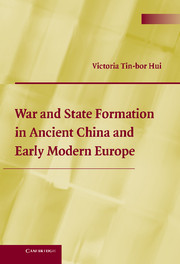Book contents
- Frontmatter
- Contents
- List of Tables and Maps
- Acknowledgments
- 1 A Dynamic Theory of World Politics
- 2 The Dynamics of International Politics in Ancient China
- 3 Rethinking the Dynamics of International Politics in Early Modern Europe
- 4 The Dynamics of State Formation and Transformation
- 5 Conclusion and Implications
- APPENDIXES
- Bibliography
- Index
4 - The Dynamics of State Formation and Transformation
Published online by Cambridge University Press: 02 February 2010
- Frontmatter
- Contents
- List of Tables and Maps
- Acknowledgments
- 1 A Dynamic Theory of World Politics
- 2 The Dynamics of International Politics in Ancient China
- 3 Rethinking the Dynamics of International Politics in Early Modern Europe
- 4 The Dynamics of State Formation and Transformation
- 5 Conclusion and Implications
- APPENDIXES
- Bibliography
- Index
Summary
War has fundamentally shaped not just international politics, but also domestic politics. Although war has brought about immense hardships and sufferings, theorists of state formation observe that military exigencies have also been conducive to citizenship rights and constitutional democracy. In Europe, when kings and princes pursued dynastic ambitions in the international arena, they were compelled to bargain with resource holders in the domestic realm. State-society bargaining for the wherewithal of war then created a variety of rights in the modern period. It is often presumed that this foundation for liberal democracy is unique to Western civilization and alien to non-Western cultures. From the perspective of comparative history, it is of critical importance that China was once a system of sovereign, territorial states in the classical era. As with the European experience, intense international competition gave rise to citizenship rights understood as recognized enforceable claims on the state that are by-products of state-society bargaining over the means of war. To motivate the people to fight and die in war, ambitious rulers made three major concessions: first, freedom of expression, as testified by the “Hundred (meaning many) Schools of Thought”; second, the right of access to justice and the right of redress before higher judges; and, third, economic rights in terms of land grants and welfare policies. Hence, citizenship rights in fact indigenously sprouted on Chinese soil long before they blossomed on European soil.
- Type
- Chapter
- Information
- War and State Formation in Ancient China and Early Modern Europe , pp. 168 - 223Publisher: Cambridge University PressPrint publication year: 2005

